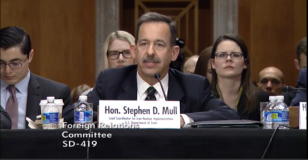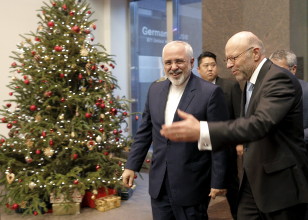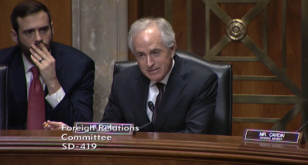By Barbara Slavin
Eager to see relief of punishing economic sanctions, Iran is moving swiftly to implement the landmark nuclear deal it reached with the international community in July. But other actions in Tehran and Washington are souring the climate for compliance.
Stephen Mull, the State Department’s lead coordinator for the agreement, faced tough questioning from Republicans and a few Democrats last Thursday about what many asserted was administration hesitancy to impose new sanctions on Iran for violating a UN Security Council resolution barring ballistic missile tests.

Stephen Mull, Lead Coordinator for Iran Nuclear Implementation for the State Dept., testifies at a Senate Foreign Relations Committee hearing December 17, 2015
Mull told the Senate Foreign Relations Committee that the U.S. is “actively considering additional measures” while acknowledging that the Security Council – on which Russia and China wield veto power – is unlikely to impose new penalties and that the U.S. has already sanctioned many Iranian entities over their missile work.
Although the tests do not violate the nuclear agreement, formally known as the Joint Comprehensive Plan of Action (JCPOA), 35 senators have urged the Obama administration to suspend sanctions relief promised in the nuclear deal over the missile firing.
Meanwhile, President Barack Obama signed into a law a mammoth spending bill that includes language that could bar dual nationals from Iraq, Syria, Sudan and Iran as well as Europeans and others who have visited those four countries since 2011 – from coming to the U.S. without a visa. The provision – which can be waived by the administration if that “is in the law enforcement or national security interests of the United States” — caused an outcry from Europeans and Iranians who worry that it could impede new trade and investment in Iran and thus potentially violate the terms of the JCPOA.

Iranian Foreign Minister Mohammad Javad Zarif (L) is greeted as he arrives at the German Mission to the United Nations in New York, December 17, 2015. Zarif participated in Syrian peace talks at the U.N. (REUTERS)
In a December 18 interview with the Al-Monitor website, Iranian Foreign Minister Javad Zarif said he had raised the issue with Secretary of State John Kerry and expected the Obama administration to take action to “bring itself into compliance with its obligations under JCPOA.” The next day, Kerry sent Zarif a letter promising that the new law “will not in any way prevent us from meeting our JCPOA commitments.”
Iran’s Supreme Leader, Ayatollah Ali Khamenei, has threatened not to carry out Iran’s side of the nuclear bargain if any new sanctions are imposed. At the same time, the Iranians have acted quickly to carry out their required steps.
Mull told the committee that Iran has removed more than 5,000 of its 19,000 centrifuges and prepared 25,000 pounds of low enriched uranium for shipment out of the country by the end of this month to Russia. He said it was possible that Iran would complete all its required tasks by the end of January.
However, other Iranian actions since the JCPOA survived Congressional scrutiny this fall have provided ample ammunition for critics to charge that the Islamic Republic will exploit the agreement to pursue other policies opposed by the United States.
Sen. Bob Corker (R-Tennessee), chairman of the Foreign Relations Committee, noted that Iranian authorities have held an Iranian-American journalist, Jason Rezaian, for more than 500 days; arrested another Iranian-American, oil executive Siamak Namazi; fired ballistic missiles; and violated a UN travel ban by sending the head of the Quds Force, Qasem Suleimani, to Moscow over the summer to discuss strategy on Syria.
Even though none of these actions are part of the nuclear deal, “this agreement is off to a really terrible start,” Corker said. He and Sen. Bob Menendez (D-N.J.) – one of four Senate Democrats to oppose the JCPOA — accused the administration of creating “a permissive environment’ for more Iranian transgressions.
“The climate appears to be deteriorating,” Kenneth Katzman, an expert on Iran and sanctions at the Congressional Research Service, concurred at a symposium later the same day at the Atlantic Council. “If Iran continues to challenge the U.S. on multiple fronts, the deal could experience significant turbulence.”
The election calendar in both countries could add to this turbulence.
One reason the government of President Hassan Rouhani is expediting required nuclear steps is because it hopes ordinary Iranians will see some economic benefits before elections in late February for a new parliament and for the body that will choose the country’s next supreme religious leader.
Hardliners opposed to Rouhani worry that pragmatists will do well in both crucial votes may be seeking to antagonize the U.S. in hopes of provoking a harsh reaction.

Sen. Bob Corker (R-Tennessee) chairs a Senate Foreign Relations Committee hearing on the Iran nuclear deal December 17, 2015
Corker, at the Senate hearing, appeared well aware of this possibility while at the same time suggesting that the Obama administration was dragging its feet on new sanctions over the missile question to help the Rouhani camp.
Mull’s State Department colleague, Thomas Countryman, Assistant Secretary in charge of the Bureau of International Security and Nonproliferation, pushed back and noted that the Obama administration “is doing exactly what the Bush administration did” in using a variety of methods to block Iran from obtaining missile and other sensitive technology.
Beyond Congressional action, the climate for implementing the nuclear agreement is being buffeted by U.S. presidential politics. At last week’s final Republican debate of the year, those running for the nomination competed with each other in denigrating the Iran deal.
While Democratic frontrunner Hillary Clinton has been more supportive, she has harshly criticized other Iranian policies and promised to “embed” tough verification of the JCPOA “in a larger effort to counter Iran across the region.”
Unfortunately, too often in international affairs, chest-thumping in one country provokes similar actions by an adversary.
The Iran deal is the best means of preventing Iran from developing nuclear weapons for at least a decade. It also opens the prospect of multilateral agreements on other crises such as the war in Syria, where the U.N. Security Council finally approved a peace plan last week.
Frank Wisner, a veteran former U.S. ambassador to Egypt and India and a participant in so-called Track II meetings with former Iranian officials over the past decade, told the Atlantic Council audience that “there aren’t any hegemons left” who can dictate outcomes in the Middle East.
“Left only are major nations [including Iran] whose interests have to be taken into account” if that region is ever to know some degree of stability again, Wisner said.

